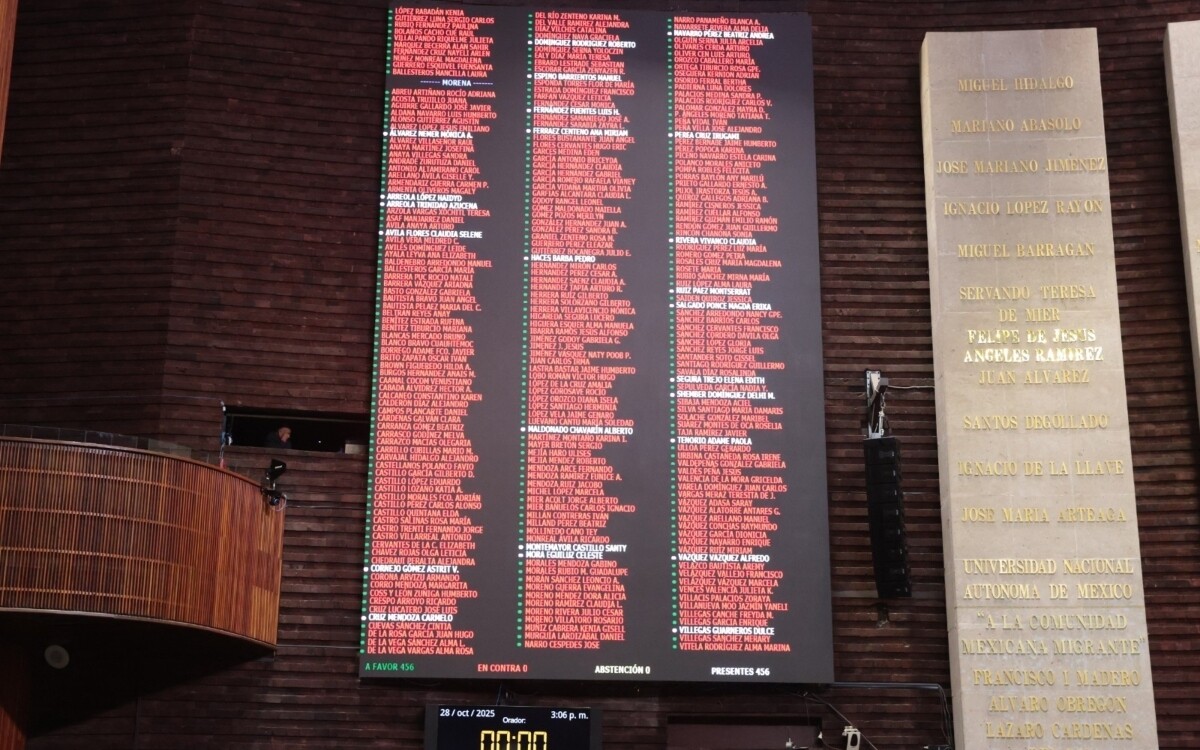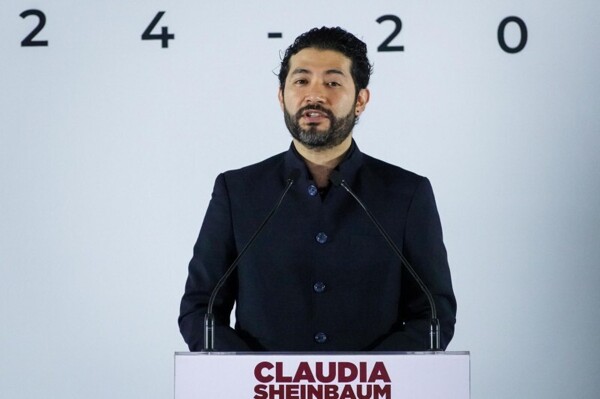
The Chamber of Deputies approved in general the bill that enacts the General Law against Extortion, with which it will be possible to prosecute ex officio those who commit said crime and punish them with up to 25 years in prison. With the unanimous vote of 456 in favor, the lower chamber approved in general the bill that enacts the General Law to Prevent, Investigate and Punish Crimes in the Matter of Extortion, regulatory of section XXI of article 73 of the Political Constitution. In addition, it amends, adds and repeals provisions of the Federal Criminal Code, the National Code of Criminal Procedure, the Federal Law against Organized Crime, the National Law of Forfeiture of Assets and the Organic Law of the Judicial Power of the Federation, according to a statement from the Chamber of Deputies. The document, which derives from the analysis of an initiative presented by President Claudia Sheinbaum Pardo, and 11 proposals promoted by deputies from Morena, PAN, PVEM and PT, complies with the decree that declares amended subsection a) of section XXI of article 73 of the Political Constitution, in the matter of extortion, which granted the Congress of the Union the power to enact the General Law that establishes, at a minimum, the type of crime and its penalties in the matter of extortion. Its objective is to establish the distribution of competencies and the forms of coordination between the authorities of the different orders of government for the prevention, investigation, prosecution and punishment of the crime of extortion and other related crimes; the basic type of crime for extortion applicable throughout the Republic, its penalties and aggravating circumstances, as well as other related crimes in the matter of extortion. It defines the rules, procedures and provisions for the investigation, prosecution, punishment and execution of the penalty for the crime of extortion, or the actions, programs and cross-cutting and inter-institutional policies that the authorities must implement in their areas of competence, for the effective prevention of the crime of extortion. The crime of extortion and the related crimes provided for in this law “will be investigated and prosecuted ex officio”. The investigation, prosecution and punishment of the crime of extortion will be in charge of the Federation, when any of the hypotheses provided for in the Organic Law of the Judicial Power of the Federation, in the National Code, in the Federal Criminal Code or in any other provision that grants jurisdiction to the Federation is updated. Also, when there is a sentence, decision or resolution from any international human rights protection body or body contemplated in any international treaty of which the Mexican State is a party, in which the responsibility or obligation of this State is determined due to a defect or omission in the investigation, prosecution or trial of the crime provided for in this Law. In addition, when the Federal Public Prosecutor's Office requests the Attorney General's Office or the prosecutor's office of the federative entity to take over the case, attending to the particular characteristics of the fact, the circumstances of its execution or its social relevance. When the commission of the crimes provided for in this law is linked to organized crime, the provisions of the law on the matter will apply. It establishes a prison sentence ranging from 6 to 15 years and a fine of 100 to 500 times the value of the Daily Updating Unit (UMA) for whoever, without right, forces another to give, do, not do or tolerate something, obtaining a benefit or profit for themselves or for another or causing someone a material, moral, physical or psychological harm. Three sets of aggravating circumstances It establishes 3 sets of aggravating circumstances. Even the notifications that must be sent to the victim can be channeled through the legal advisor or the Public Ministry, in order to avoid any direct contact with the perpetrators of the crime. It provides for the creation of the Center for Attention to Complaints for the Crime of Extortion (Center), attached to the Secretariat of Security and Citizen Protection, whose purpose will be to strengthen the bond with citizenship, as well as to guarantee the reception, registration, channeling, attention and follow-up of complaints filed, through the unique number 089. In the transitional regime, it states that, in pending processes to be sentenced in first and second instance, from the entry into force of this Decree, the judicial body may carry out the translation of the type in favor of the person to be sentenced, in accordance with the criminal conduct of extortion, its modalities or aggravating circumstances that have been proven. In the case of a sentenced person - it clarifies - the execution judge may consider the review of the penalties that have been imposed to carry out, if applicable, the translation of the type, as long as the conduct, modalities or aggravating circumstances proceed and result in their favor. In addition, within a period of no more than 180 calendar days from the entry into force of this Decree, the legislatures of the federative entities will proceed to make legal reforms to harmonize them with this Decree. For its part, penitentiary centers will have 180 business days counted from the entry into force of this Decree to establish the procedures and technologies for the inhibition of entry and exit of cellular telephone calls, radio communication, voice transmission, data or image referred to in article 38 of the General Law, and the Center for Attention to Complaints will begin to function no later than 180 business days counted from the entry into force of this Decree. The first increases the base penalty by up to one third, if the active subject manifests his intention to continue obtaining a benefit in kind, money or goods, for the collection of fees or benefits of any kind; if it is committed against a person who carries out commercial, business, industrial, agricultural, livestock, fishing, public or private service activities. Likewise, when the active subject, by himself or on behalf of a union, group or association, real or simulated, coerces the victim into contracting, obtaining or acquiring from another person, whether natural or legal, goods, supplies or services for the development of their commercial activity. Also, when he imposes on the victim the price of the products, goods or services that he commercializes, the payment of the extortion is deposited in a bank account of the Mexican financial system or any other country, and a third party is used without knowing the criminal fact. The second, from one third to half of the penalty if it is committed against one or several migrants or against a person under 18 years of age, pregnant or over 60 years of age; if private information of the victim or their relatives is used, such as personal data, images, audios, texts or videos, whether real, manipulated or altered, to coerce them. Similarly, if communication media are used through which the transmission, reception or reception of signs, signals, writings, images, voice, data, sounds or information of any nature or any other electronic means of communication can be carried out, and by any means it is stated that a person is deprived of liberty, without being so, and the payment of a certain amount of money or benefit in kind is demanded for their alleged release. The third, from half to two thirds when physical or moral violence is used to demand the payment for damage, derived from a traffic caused intentionally; if physical, moral or psychological violence is used to demand the payment for damage occurred in some object of their property, derived from a supposed accident whatever it is; if one or more armed persons intervene, or carrying dangerous instruments or other object of appearance, shape or configuration of firearms. Likewise, if the object or result is to obstruct, restrict, prevent, annul or impair the exercise of the right to freedom of expression or the defense of human rights; the active subject is deprived of liberty in a penitentiary center at the disposal of any authority, regardless of its procedural situation; if persons under the age of 18 are used or employed, and it is carried out causing damage to the facilities of businesses, businesses or goods in property or possession of the victim. In addition, the law provides for punishing all those who facilitate, support, cooperate or assist in the commission of the crime of extortion and, whoever introduces or attempts to introduce into a penitentiary center any electronic device or its components. It specifies that “any person who suffers an extortion may file a complaint without the need to reveal their identity”, using mechanisms such as number 089; in the matter of investigation the police will act under the command and direction of the Public Ministry, with the support of specialized expert personnel and access to intelligence mechanisms, as well as to investigation techniques under judicial control such as the interception of communications or the review of banking information, and they must also attend to the use of electronic media such as social networks, instant messaging or digital platforms. In addition, in the matter of criminal execution “those sentenced for extortion will not have access to pre-release benefits or to the commutation of the sentence”, except in exceptional cases of effective collaboration with justice; the directors of penitentiary centers must guarantee that persons sentenced for the crime of extortion do not have access to digital or electronic media, as well as implement procedures and technologies that inhibit the entry and exit of cellular telephone calls, radio communication and voice, data or image transmission within their perimeter. It provides for the reservation of identity in judicial proceedings, avoiding the exposure of sensitive data; the use of dissociation or anonymization mechanisms that make visual or auditory identification impossible during proceedings, and the possibility of participating remotely during the procedure through the use of technologies.













